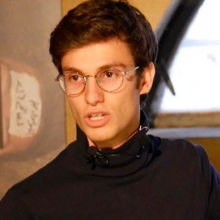We are hopeful for the future, and, paradoxically, it comes from the same criminals that have inflicted so much pain on us.
January 13, 2022 marks an extremely important and symbolic day for the Syrian people. Anwar Raslan, a senior Assad regime official, responsible for inflicting unimaginable pain on thousands of Syrian detainees, including me, was sentenced to life in prison in what is already considered a landmark judgment in Koblenz, Germany.
It is clear that no verdict will fix the broken heart of a mother whose son was tortured and killed in detention, nor bring any of the victims back to their loved ones. There is nothing on this planet able to compensate me for the three years I was detained and tortured in a Syrian prison as a minor. There is nothing on this planet that can bring my father and my brothers back to me. They are gone. The regime took them from me.
So now, when I look at this verdict, I do not take it for its literal meaning, but as part of a bigger picture. This ruling sets a precedent for other nations to follow Germany’s lead in prosecuting the crimes of the Bashar al Assad regime.
As I am heartened by this measure of justice, I am appalled at the willingness of some countries to befriend a war criminal. Today, some countries’ efforts to normalise relations with Assad are more prominent in the news than the ongoing mass atrocities being committed by the criminal regime.
By normalising with Assad, these countries are permitting the regime’s machinery of death to continue with impunity. They are sending the message to dictators and tyrants around the world that they too can displace, gas, and torture civilians as a means to remain in power.
I know what it feels like to be oppressed by a ruthless regime. Although I was not held in Branch 251, the notorious secret service unit of which Raslan was head, I know how it must have felt for the victims of torture that were able to sit in a court of law and face their torturers in Koblenz.
They finally achieved what seemed impossible. These victims had not even been able to think about surviving, let alone prosecuting those responsible. Yet they were able to sit in court in front of those that tortured them and receive some semblance of justice. Watching them gives me some degree of satisfaction and I hope one day I will face my torturers again, in a courtroom, where the judge will punish them for their crimes.
This being said, justice cannot repair victims or amend our suffering. The crimes committed by the Assad regime and its allies are truly irreparable. However, we are hopeful for the future, and, paradoxically, it comes from the same criminals that have inflicted so much pain on us. If Assad once managed to divide the Syrian population, a decade later he and his atrocities are the main cause the Syrian people are so united and working together to hold him accountable.
Assad divided, weakened and conquered us; but now, the pain experienced and hunger for justice brought us back together, strengthened and empowered us to be drivers for change. Strong enough to remain resilient while the world turns a blind eye and attempts to rehabilitate the same criminal regime found guilty in Koblenz.
As someone who has been detained, tortured, displaced, stripped of his loved ones, as someone who has dedicated his life to advocate for justice in Syria, the Koblenz verdict renews hope and trust in international law. It renews the hope that I need to continue my advocacy for human rights in Syria.
But more than that, Koblenz reaffirms that the crimes taking place not only in Branch 251 but throughout Syria at the hands of the Assad regime are real. The fact that the systematic machinery of death of a regime currently in power, including unlawful arrests, torture, death, and mass graves of thousands of innocent civilians, has been proven in court, should be enough to radically discard the possibility of rehabilitating the Assad regime.
While Koblenz is an important precedent, there is still much to be done. This is just the beginning of a significant journey that will move this dictator from his seat of power to a seat in court, where he truly belongs.
As mass atrocities continue to unfold in Syria, the international community must stand united against any normalisation with the Assad regime. They must uphold their duty in pursuing justice, and more urgently, in ending the killing in Syria.














0 Comments